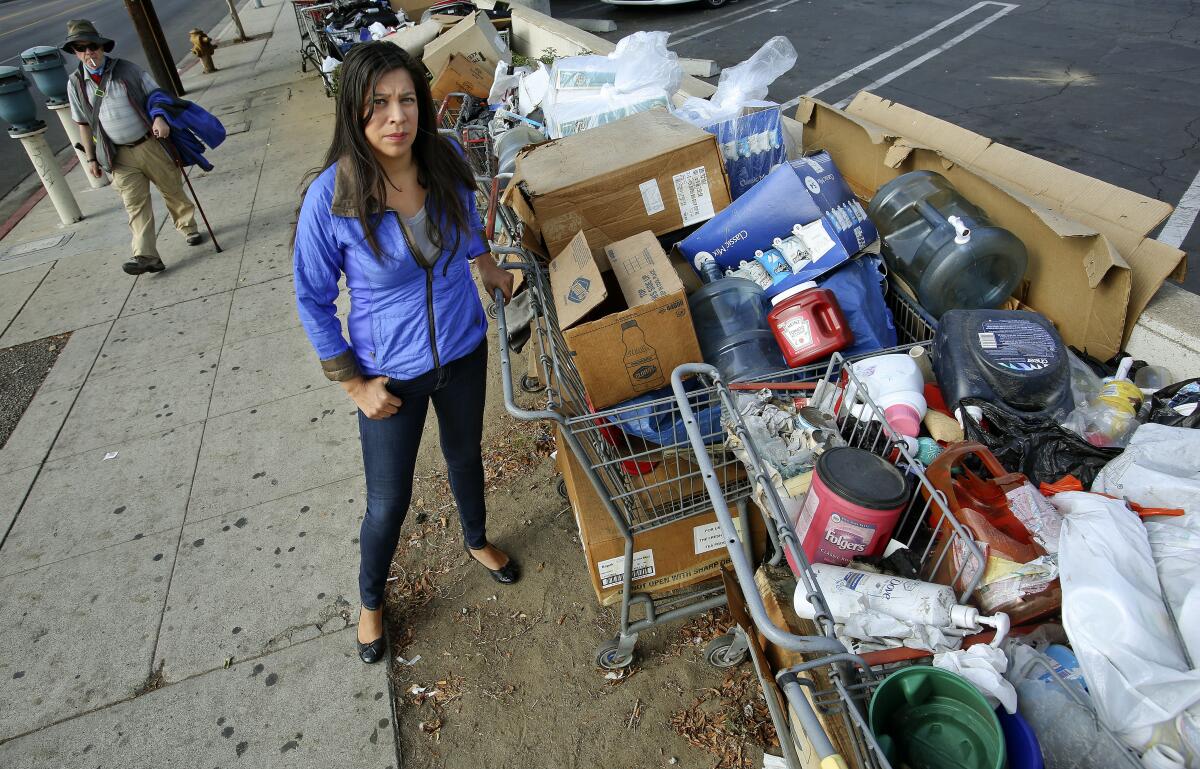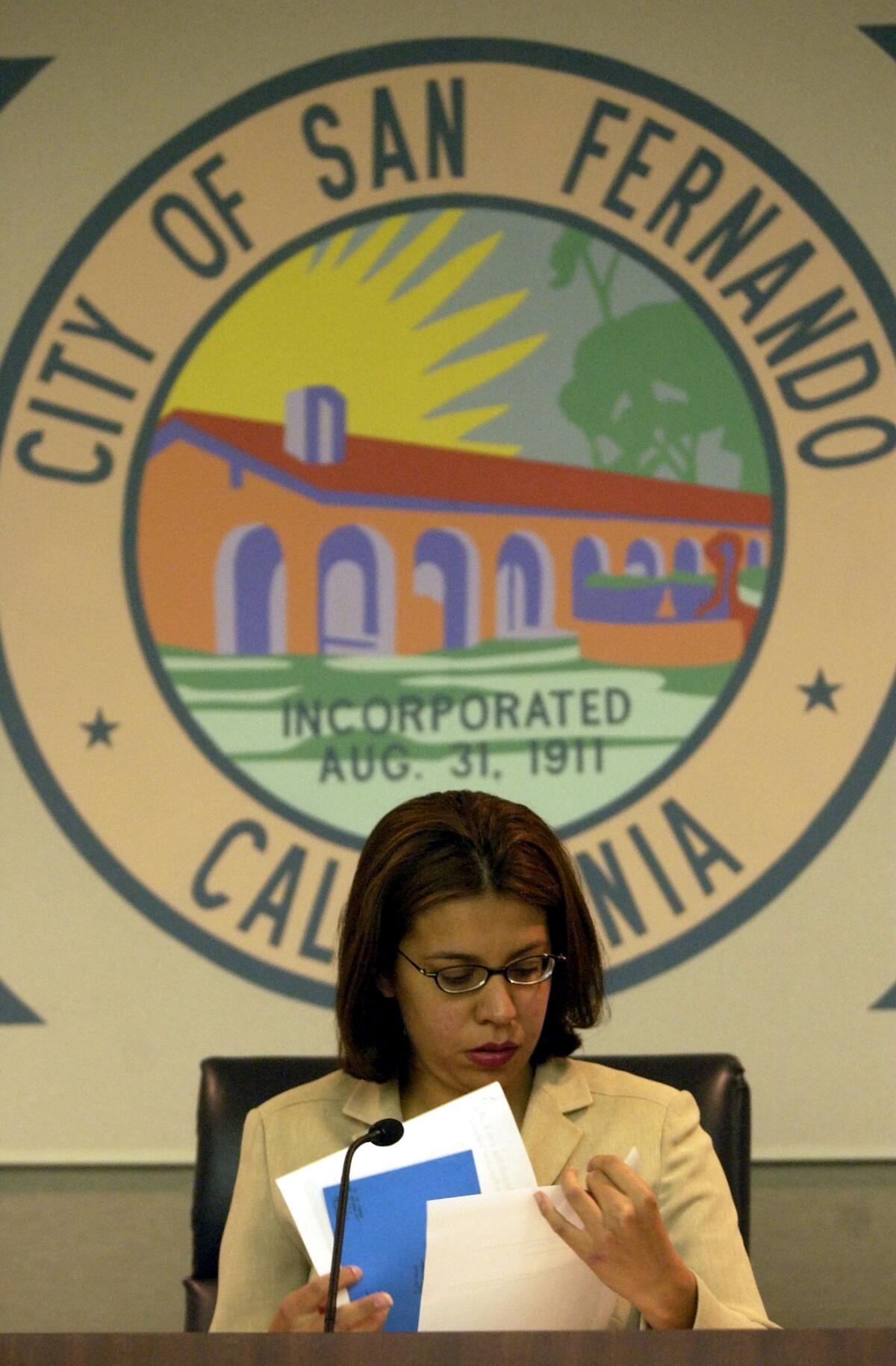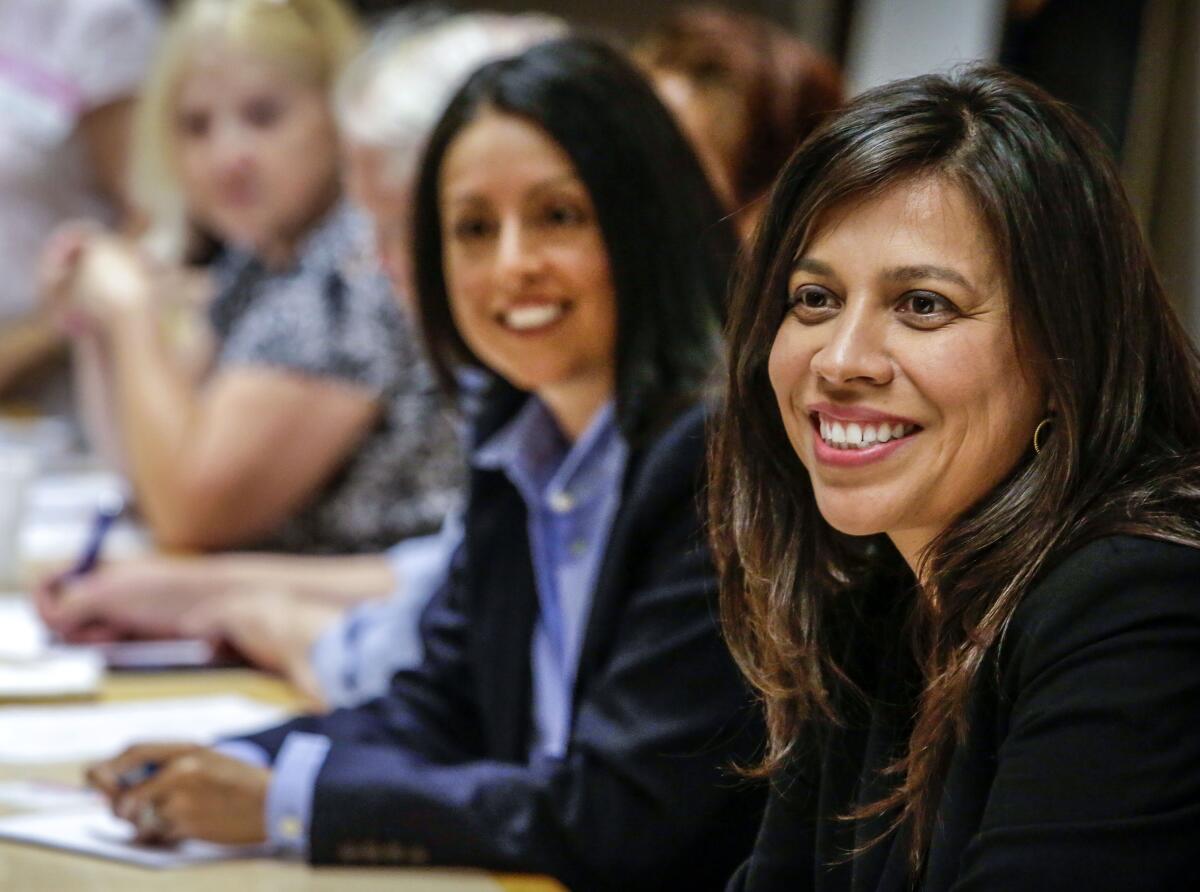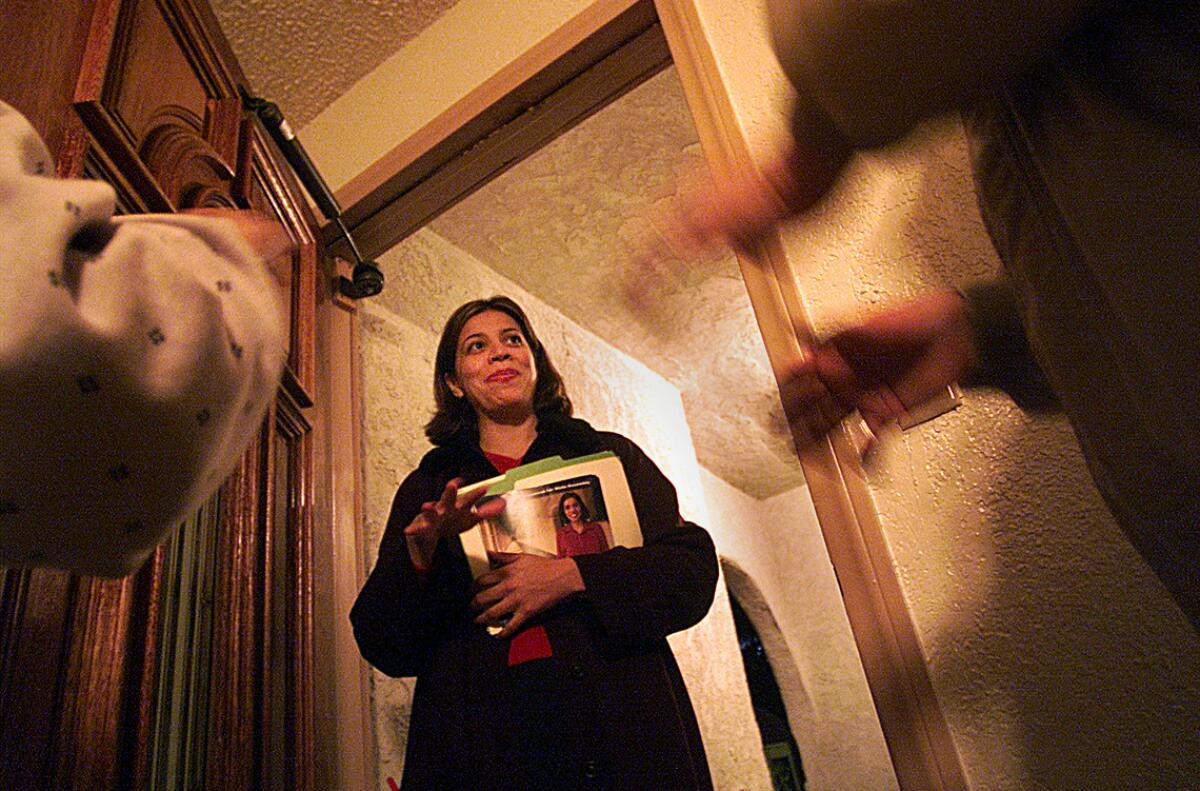Cindy Montañez, environmental and political pioneer, reflects as her time runs out

- Share via
It’s been a tough year for Los Angeles’ Latino political icons.
Former L.A. County Supervisor Gloria Molina passed away from cancer in May. Former Assemblymember and L.A. Councilmember Richard Alatorre, an architect of Eastside political power, suffered a heart attack last month, but is recovering.
Now, San Fernando Councilmember and former Assemblymember Cindy Montañez is in the late stages of an aggressive cancer that has left her unable to walk.
Molina and Alatorre were at least able to serve decades in office and live long lives.
Montañez is just 49.
On Monday, the state Assembly passed a resolution that declared Jan. 19 Cindy Montañez Day, as she and her family looked on. The following day, they were at L.A. City Hall as the City Council voted unanimously to rename Pacoima Wash Natural Park after Montañez for her decades-long work to clean up the Los Angeles River tributary.
The daughter of immigrants from Veracruz and Chihuahua, Montañez is a political pioneer many times over. In 1993, she and her sister pushed for the establishment of a Chicano Studies department at UCLA by joining a 14-day hunger strike that inspired young Latinos across Southern California. Six years later, Montañez won a seat on the San Fernando City Council, becoming one of the first members of the Prop. 187 generation to win elected office in L.A. County.

She became the city’s youngest mayor, then the youngest women elected to the California State Assembly at age 28. Her victories set the stage for Latinas like L.A. Councilmembers Imelda Padilla and Monica Rodriguez, Assemblymember Luz Rivas and L.A. Unified School Board trustee Kelly Gonez to represent the San Fernando Valley where they all grew up.
Just as important is Montañez’s fight for environmental justice, the through line in her life and career.
Montañez was among the first Latino politicians to focus on it as a campaign plank. She planted trees alongside her family as a teen, then worked as an assistant general manager at the Department of Water and Power as the agency began to think about how to green L.A.’s electrical grid and do a better job of capturing stormwater. As chief executive of TreePeople, which plants trees to provide shade for working class communities, she is one of the few Latinas at the top of a major U.S. environmental nonprofit.
A young and eager-to-serve Latina mayor eyes the next rung on her political ladder
I recently visited Montañez on a 103-degree day at her family home in San Fernando, a mini-oasis in the brutal heat. Sprawling plumerias, a prickly pear cactus and a gorgeous crown of thorns stood next to a wrought iron fence. Raised planter boxes and pots held colorful flowers. Trees lined the right side of the house from the front to the back; three more grew on the curb strip.
The only thing off about the scene was the drab wheelchair ramp that led to the front door.
“I’m starting to get more of these [recognitions] now that people know that I’m sick,” Montañez told me.
We talked in her living room, where she sat on a comfy chair. On a bookshelf across from her was a statue of the Santo Niño de Atocha; below it was a painting of Muhammad Ali that one of her sisters bought for inspiration after Montañez began chemotherapy. On the wall was a seal commemorating her time in the California State Assembly and a photo of her with former California Gov. Arnold Schwarzenegger.
“A couple of Sundays ago, the community put a thank-you party together,” she continued. “The number of people that showed up, and what they said ... it was so touching.”
I told Montañez it was a testament to her accomplishments. Teary-eyed former and current staffers looked on. Her mother readied something in the kitchen.
“Thank you,” Montañez said, then paused. Her voice cracked.
“I wish I did more.”

Though gaunt and slow in her speech, she never tired during our one-hour conversation. Her memory, beaming smile and gentle humor remained strong. So did her storytelling talent. Like the time supporters held her first fundraising party — the star attraction wasn’t Montañez so much as it was the all-you-can-eat, Zacatecas-style beef barbacoa at $10 a plate.
“We had all these people come,” she remembered, laughing. “Like 300, 400 people.”
I wanted to talk to Montañez about her career and L.A.’s political scene, but the historically hot day was on everyone’s mind. So I asked how the summers had changed in the Valley during her lifetime.
“Worse than I could’ve ever feared,” she replied. “It didn’t get this hot this long, and this much. When we were growing up, we were the recipients of everything that was bad. It’s sad to say, but things are still the same. Yeah, things have changed to make things better, but they haven’t changed enough.”
Why not?
“We as Latino officials, when we started, we weren’t [really] going after the money to do the infrastructure improvement,” she said. It bothered her so much as an Assembly member that she eventually called up Joseph T. Edmiston, the longtime executive director of the Santa Monica Mountains Conservancy. That’s the powerful state agency in charge of acquiring and preserving open space in Southern California.
“The L.A. River was getting all the attention,” Montañez said. “So I told Joe, ‘Hey, here I am in Sacramento, voting [to protect] preserves in Santa Monica. We gotta do something for our [San Fernando Valley] communities.”
The two provided key early support to envision the Pacoima Wash — once little more than a toxic, trash-strewn dumping area — as a greenway with bike trails, walking paths and pedestrian bridges. Montañez’s advocacy continues to pay dividends: this summer, the Bezos Earth Fund announced a $3.5-million grant to the nonprofit Pacoima Beautiful to oversee the first phase of the wash’s beautification, and $1.9 million to TreePeople to plant over 4,000 trees.
“I did what I could,” she said. Then Montañez laughed wryly. “But I wish I could live longer.”
I wondered out loud what would’ve happened if her rise in politics hadn’t been stymied by two elections that changed the course of San Fernando Valley, L.A. and California politics.

In 2006, Alex Padilla, now a U.S. senator, beat her for the state Senate seat held by her political mentor, Richard Alarcon. She didn’t run for office again until 2013, in an L.A. City Council special election to replace Padilla’s mentor, Tony Cárdenas, after he moved on to Congress.
Her opponent in the special election? Her 2002 Assembly campaign manager, Nury Martinez. Montañez placed first in the primary election, then narrowly lost in the runoff.
Martinez trounced Montañez in a rematch two years later, then rose to become the first Latina council president, a position she resigned in disgrace last year in the wake of a leaked conversation that captured her trashing Black people, Oaxacans and basically everyone. Montañez received a slew of messages urging her to run to replace her former friend, but she declined.
So was Montañez happy about the way her career turned out — back to where she started on the San Fernando City Council and heading a nonprofit, instead of at the top of Latino political power in the Valley?
“Absolutely — yes!” she exclaimed. “Oh my gosh, I can’t tell you how happy I am. How proud I am of the team we put together to truly move people and educate folks and have fun. In politics, it’s all fighting.
“Democrats fighting with Republicans, and Republicans fighting with Democrats,” she continued. “And Democrats fighting Democrats because they’re too liberal, and not liberal enough. And they’re not getting anything done. So absolutely — yes, I’m so glad. Everything happens for a reason.”

Dolores Huerta was on her way, so I needed to leave. I asked Montañez how she wanted people to remember her. She waved at the many butterfly mementos in her living room, gifts from visitors.
“Monarcas, in particular,” she said. “I want people to think of me every time they see the beautiful monarch butterfly. I love them because they’re like us. They’re bicultural. They go to Michoacán and then they go to the States.
“So I want people to remember me every time I sit on their shoulder.” She smiled once more. “I’ll tap them, so they could just think, ‘Hey, what would Cindy have me do?’”
I shook her hand, then went to my Yukon. I had parked in the shade and left the windows cracked open. When I drove off, my dashboard thermometer registered 110 degrees.
More to Read
Sign up for Essential California
The most important California stories and recommendations in your inbox every morning.
You may occasionally receive promotional content from the Los Angeles Times.














